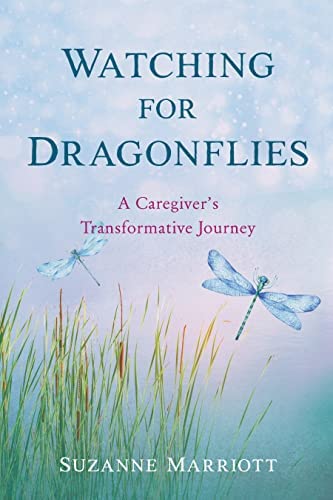Play & Book Excerpts
Watching for Dragonflies
(She Writes Press)
© Suzanne Marriott
It frightens me to watch his body deteriorate, his legs refusing to work and his muscles beginning to atrophy. I wish with all my heart I had the power to stop—to reverse—these changes. But I can’t, and I wonder just how much I will be able to do. Am I really up to this challenge? Will I find the strength to face this new and uncertain future?
Yesterday we were in the kitchen together, making sandwiches for lunch. Suddenly he stopped spreading mayonnaise on a piece of bread. “I’m frightened,” he said.
I put my arms around him and told him I was frightened too.
***
Michael sleeps most of the time at first. He is unable to eat, and the doctor orders a feeding tube to be threaded through his nose and down into his stomach. On this day, I stand helplessly at the foot of his bed, watching the procedure begin. It wakes him up. He has no idea what is happening to him, and he becomes fighting mad. “Get away from me! Get that goddamn thing out of my nose!” he yells as two people hold him down while the doctor tries to insert the tube. I am amazed that suddenly he has the energy to protest and yell. I try to calm him and explain what is happening and why it must happen, but it’s no use. I can only stand there with tears streaming down my cheeks as I watch him suffer. My instinct is to protect him, but I know the procedure is necessary, and I let it happen. I feel as if I’m betraying him.
Finally, because Michael keeps trying to pull out his feeding tube, they put restraints on his wrists—“bracelets” with straps tied to the bed frame. I have to give permission for this. It breaks my heart to see my husband’s hands tied to the bed, to see him unable to lift his arms and unable to understand why. By now, thanks to the intravenous antibiotics he’s receiving, he’s stronger and more alert. He pleads with me to take off the restraints and doesn’t understand when I won’t. Sometimes he promises not to pull his tube out, looking me directly in the eyes with an oh-so-assuring stare. I learn I can’t trust him. He probably just forgets, feels the tube irritating his nose, and makes a grab for it.
***
I arrive at the acute-care facility at eight o’clock, less than an hour after leaving the hospital. I inquire at several of the nurses’ desks in the sprawling one-floor facility, but I can’t find Michael. Finally, someone tells me to check a certain wing, where patients are kept waiting until a bed becomes available. Annoyed and concerned, I make my way through a maze of corridors.
Unlike the rest of the facility, this area reeks of urine. Tentatively, I make my way down the hall, checking for Michael in each room. At the last room at the end of the hall on my left, I find Michael lying on a mattress on the floor. His urine bag is lying on his stomach, preventing his urine from draining properly, if at all. There is no attendant, and three other patients are in the room, also on the floor. Michael is not hooked up to his IV.
“Get me out of here!” he begs as soon as he sees me.
I feel a rush of heat envelop my body. I am livid. I reassure him and race down the hall to find help. I see a woman I take to be an aide and ask to see the RN in charge. She tells me the RN is on break and I will have to wait. It is now quarter to nine.
“Get that woman down here right now or I am going to call an ambulance and have my husband removed from this facility at once,” I demand. I am angry and focused.
She gets the message, and in a minute or two, the RN in charge appears and leisurely walks over to ask what the problem is.
Somehow containing my rage but speaking emphatically, I tell her, “It is not acceptable to have my husband on the floor. Either you get him into the room we were told was waiting for him or I am going to have him removed.”
She gets it, too, probably because I take out a notebook and begin taking notes. She jumps into action and has patients moved around so there’s a room available for Michael. Clearly, they weren’t ready for him at all.
I go back to be with Michael as these arrangements are being made. I try to make him as comfortable as I can until he is moved; they haven’t even given him a pillow. I feel as if we’ve fallen into a medieval dungeon. What if I hadn’t been here? How long would he have been left like this, completely helpless and ignored, with his urine backing up and no hydration or medication?
At nine fifteen, they bring a regular hospital bed into the room where Michael is lying. Miraculously, eight people come in to lift Michael onto the bed. When they back away from the bed, I notice Michael is shivering. They’ve put him directly onto a cold air mattress without putting a cloth sheet over it first. When I point out this oversight to them, they lift him up and put a cloth sheet in place. It is now nine thirty.
He is rolled into a regular room occupied by one other man. As I follow, I’m relieved to note there is no smell of urine in the hall in this part of the building.
I take Michael’s hand. “It’s going to be all right,” I reassure him.
Yesterday we were in the kitchen together, making sandwiches for lunch. Suddenly he stopped spreading mayonnaise on a piece of bread. “I’m frightened,” he said.
I put my arms around him and told him I was frightened too.
***
Michael sleeps most of the time at first. He is unable to eat, and the doctor orders a feeding tube to be threaded through his nose and down into his stomach. On this day, I stand helplessly at the foot of his bed, watching the procedure begin. It wakes him up. He has no idea what is happening to him, and he becomes fighting mad. “Get away from me! Get that goddamn thing out of my nose!” he yells as two people hold him down while the doctor tries to insert the tube. I am amazed that suddenly he has the energy to protest and yell. I try to calm him and explain what is happening and why it must happen, but it’s no use. I can only stand there with tears streaming down my cheeks as I watch him suffer. My instinct is to protect him, but I know the procedure is necessary, and I let it happen. I feel as if I’m betraying him.
Finally, because Michael keeps trying to pull out his feeding tube, they put restraints on his wrists—“bracelets” with straps tied to the bed frame. I have to give permission for this. It breaks my heart to see my husband’s hands tied to the bed, to see him unable to lift his arms and unable to understand why. By now, thanks to the intravenous antibiotics he’s receiving, he’s stronger and more alert. He pleads with me to take off the restraints and doesn’t understand when I won’t. Sometimes he promises not to pull his tube out, looking me directly in the eyes with an oh-so-assuring stare. I learn I can’t trust him. He probably just forgets, feels the tube irritating his nose, and makes a grab for it.
***
I arrive at the acute-care facility at eight o’clock, less than an hour after leaving the hospital. I inquire at several of the nurses’ desks in the sprawling one-floor facility, but I can’t find Michael. Finally, someone tells me to check a certain wing, where patients are kept waiting until a bed becomes available. Annoyed and concerned, I make my way through a maze of corridors.
Unlike the rest of the facility, this area reeks of urine. Tentatively, I make my way down the hall, checking for Michael in each room. At the last room at the end of the hall on my left, I find Michael lying on a mattress on the floor. His urine bag is lying on his stomach, preventing his urine from draining properly, if at all. There is no attendant, and three other patients are in the room, also on the floor. Michael is not hooked up to his IV.
“Get me out of here!” he begs as soon as he sees me.
I feel a rush of heat envelop my body. I am livid. I reassure him and race down the hall to find help. I see a woman I take to be an aide and ask to see the RN in charge. She tells me the RN is on break and I will have to wait. It is now quarter to nine.
“Get that woman down here right now or I am going to call an ambulance and have my husband removed from this facility at once,” I demand. I am angry and focused.
She gets the message, and in a minute or two, the RN in charge appears and leisurely walks over to ask what the problem is.
Somehow containing my rage but speaking emphatically, I tell her, “It is not acceptable to have my husband on the floor. Either you get him into the room we were told was waiting for him or I am going to have him removed.”
She gets it, too, probably because I take out a notebook and begin taking notes. She jumps into action and has patients moved around so there’s a room available for Michael. Clearly, they weren’t ready for him at all.
I go back to be with Michael as these arrangements are being made. I try to make him as comfortable as I can until he is moved; they haven’t even given him a pillow. I feel as if we’ve fallen into a medieval dungeon. What if I hadn’t been here? How long would he have been left like this, completely helpless and ignored, with his urine backing up and no hydration or medication?
At nine fifteen, they bring a regular hospital bed into the room where Michael is lying. Miraculously, eight people come in to lift Michael onto the bed. When they back away from the bed, I notice Michael is shivering. They’ve put him directly onto a cold air mattress without putting a cloth sheet over it first. When I point out this oversight to them, they lift him up and put a cloth sheet in place. It is now nine thirty.
He is rolled into a regular room occupied by one other man. As I follow, I’m relieved to note there is no smell of urine in the hall in this part of the building.
I take Michael’s hand. “It’s going to be all right,” I reassure him.
|
Suzanne Marriott is a memoirist and deep-travel writer who shares her transformative experiences with readers. Her writings on compassionate caregiving have been published in The Union newspaper’s Healthy You magazine, and her stories of deep travel have appeared in Your Life is a Trip, an award-winning e-magazine. She is a member of The Institute of Noetic Sciences, Sierra Writers, and the National Association of Memoir Writers.
She lives in an ecologically conscious cohousing community in the Sierra Nevada foothills. Follow Suzanne on:
|
Photo Courtesy: Suzanne Marriott
|




